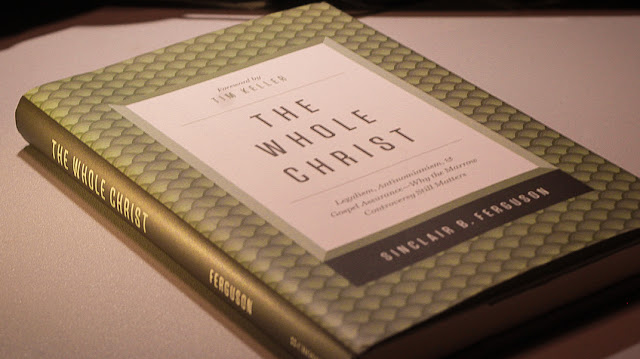Controversies, Creeds, Confessions, and Catechisms
The Whole Christ by Sinclair Fergusson
Wading through this gem as I spent 3 hours in a shoot doing nothing but read, I have come to understand what has always puzzled me - the horror most well meaning Christians have when somebody mentions the word "works" and "grace" in the same sentence. The topic is nothing new, and is still far from being realized. This among others confirm what I have always understood: That as unregenerate reprobates we were once in enmity to God and His laws, but Christ has come to reconcile us as new creatures to the same eternal law. Not freed from it, but freed for it.
"Since we’re saved by grace alone, does the law of God have a place in the life of a Christian? This perennial question is essential to answer if we are to be faithful followers of Christ. In this series, Dr. Sinclair Ferguson expands on his book and illustrates the biblical relationship between God’s grace and our work. Dr. Ferguson makes it clear that the solution to both legalism and lawlessness is the same—a right understanding of the gospel of Jesus Christ."
Since the days of the early church, Christians have wrestled with the relationship between law and gospel. If, as the apostle Paul says, salvation is by grace and the law cannot save, what relevance does the law have for Christians today?
By revisiting the Marrow Controversy - a famous but largely forgotten eighteenth-century debate related to the proper relationship between God’s grace and our works - Sinclair B. Ferguson sheds light on this central issue and why it still matters today. In doing so, he explains how our understanding of the relationship between law and gospel determines our approach to evangelism, our pursuit of sanctification, and even our understanding of God himself.
Ferguson shows us that the antidote to the poison of legalism on the one hand and antinomianism on the other is one and the same: the life-giving gospel of Jesus Christ, in whom we are simultaneously justified by faith, freed for good works, and assured of salvation.
Book Description from Ligonier and RTS
Creeds, Confessions, & Catechisms
For centuries, followers of Jesus have used creeds and confessions to express their Christian beliefs. Summarizing key truths from Scripture into succinct statements, these words have shaped the church for generations and continue to teach and inspire believers today.
Creeds, Confessions, and Catechisms gathers 13 historic statements of faith—including the Apostles’ Creed, the Belgic Confession, and the Heidelberg Catechism—into one beautiful collection. Each text includes an introduction from editor Chad Van Dixhoorn that explains its origins and significance to the early church. By learning and revisiting these timeless confessions of faith, readers can grow spiritually and learn more about Christian history.
A Catechism is a manual of Christian doctrine drawn up in the form of questions and answers, especially one for religious instruction. The first such manual was compiled by the English scholar Alcuin in the 8th century. Emphasis on the use of a catechism, particularly its memorization by rote, has diminished in recent years.
A confession is a manual of Christian doctrine drawn up in the form of essays. Confessions are typically written in a chapter format and grouped according to a particular subject. there are a great number of proof texts which provide the Scriptural basis for each subject.
Creeds are authoritative summaries of the principal articles of faith of various churches or bodies of believers. Since doctrines are subject to elaboration and interpretation that cause differences of opinion detailed creeds become necessary to emphasize the differences between the tenets of schismatic branches. They also serve as formulations of belief when liturgical usage, as in the administration of baptism, requires a profession of faith.
This book includes the following:
- Apostles Creed
- Nicene Creed
- Athanasian Creed
- Chalcedonian Definition
- Ausburg Confession
- Belgic Confession
- Articles of Religion
- Canons of Dort
- Westminster Confession
- London Baptist Confession
- Heidelberg Catechism
- Westminster Larger Catechism
- Westminster Shorter Catechism
Book Description from Crossway.org




Comments
Post a Comment